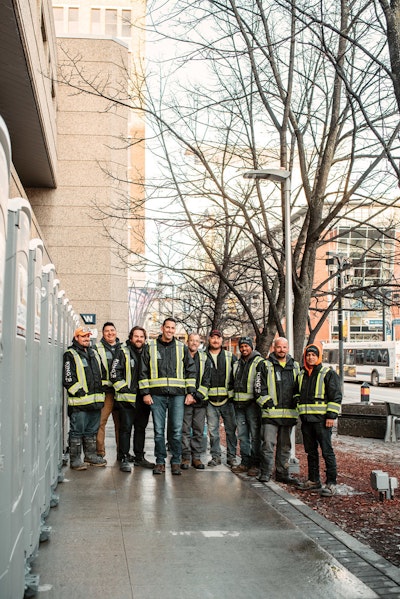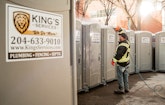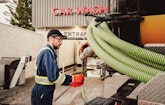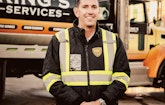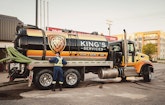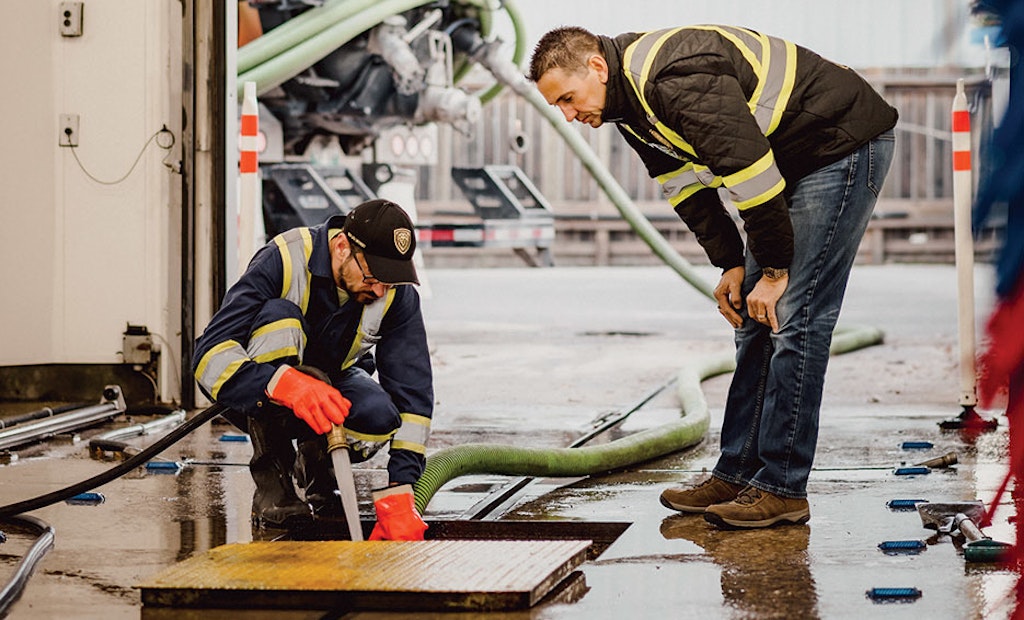In 2004 Steve Moon was working at a bank as a certified public accountant helping companies buy and sell businesses when one of those businesses caught his eye. As a result, his career headed off in a very different direction. He knew nothing about portable sanitation or septic systems but could see that King’s Septic and Portable Toilet Service had good numbers and a lot of promise. He left banking and bought the business.
Between the operational expertise of its then eight employees and Moon’s business savvy, the transition went fairly smoothly. But to help him really get up to speed, Moon embarked upon an intense period of education on everything from industry basics to employee management — and he hasn’t stopped since. “I really have a ‘never stop learning’ attitude,” he says. “I really focus on that.” And that applies not only to himself, but to his employees as well.
Moon believes continuing education — along with providing good customer service and taking care of employees — has been a big key to his success in growing the company to its current 35 employees. He’s also added two service lines — plumbing/drain cleaning and fencing. The company, now called King’s Services, operates out of a 13,000-square-foot facility in Headingley, Manitoba, and serves a 30-mile radius around the greater Winnipeg market.
GROWTH SPURT
Although Moon says he wasn’t necessarily looking to buy a business, he isn’t entirely surprised he did. “My dad owned his own business, a tool-and-die and welding shop, so I’ve always had that entrepreneurial blood in me,” he says. At one time, he entertained the idea of taking over his father’s business but knew it just didn’t suit his interests or skills.
King’s was a well-established company, founded in 1985 by Bruce King. Moon saw it had a great customer base, consistent cash flow, growth potential and a lot of small players in the sector, indicating acquisition potential, which suited his background. In 2008 he bought a local company, adding to his inventory and customer base. The purchase came along with the former owner, Gerry Girardin, who worked as his director of operations for 10 years before retiring.
In 2017 Moon bought the local division of a national fence business, Modu-Loc, enabling him to offer temporary fencing to his portable restroom customers. Five people work in that division along with Terry Rempel, manager.
And in 2018 he added a plumbing and drain cleaning division after receiving a number of customer requests — “If you listen to your customers, they’ll tell you what they want.” Rempel also manages this division and oversees two employees. Equipment includes Ford and Chevy service vans, a RIDGID camera and three RIDGID drain cleaners in sizes to handle anything from sinks to sewer mains. To help build up that business, he began offering home inspections.
“A home is the biggest investment people have, and they don’t do a lot of maintenance on it,” Moon says. “The No. 1 cause of damage in a house is water. So by having that inspection of the hot-water tank, lines, drains, toilets, we’re trying to be a little more preventive on this stuff rather than ‘Oh my God, I’ve got a problem.’”
WINTER JACKETS
Manager Mike Campbell and 11 technicians work in the portable sanitation division, which accounts for about half the company’s revenue. About 80% of its work is for construction. Events include the Father’s Day Manitoba Marathon, numerous Canada Day activities involving all units and the Winnipeg ManyFest community festival.
Inventory includes 1,100 standard units, 35 handicapped-accessible units, 40 high-rise units and 50 hand-wash stations — all from Satellite | PolyPortables. Moon likes gray for his units. “It’s not the flashiest color, but I think it shows dirt the least and seems a little more upscale,” he explains.
About 10 years ago, a marketing student who Moon hired for the summer conducted customer surveys, and one thing that kept coming up was the desire for heated units in the winter. So Moon developed a couple solutions. At the low end, they offer a windproof and waterproof parka with an R-4 insulation value. “It’s basically a jacket that goes over a regular portable toilet, along with a space heater inside the unit,” Moon says. The company has them built based on a patent Moon picked up with one of his acquisitions. At the higher end, he offers single and double trailers with running water and electric heat that are designed by the company and built in-house. They have about 50 of those along with one higher-end trailer from Rich Specialty Trailers.
The company has five restroom transport options — 7-, 9- and 14-unit trailers from Saturn Industries and a 12-unit trailer from McKee Technologies. Its 2016 Ford F‑550 built out by Satellite Vacuum Trucks holds eight units and has a 400-gallon tank and Masport pump. They also have six Ford F‑550s (2012-17) vacuum trucks, two built out by SchellVac Equipment with 650-gallon waste and 300-gallon freshwater carbon steel tanks and Fruitland 250 pumps, and four from Satellite Vacuum Trucks with Masport HXL4V pumps, one with a 775-gallon waste and 400-gallon freshwater aluminum tank, one with a 450-gallon waste and 150-gallon freshwater steel tank, and two with 650-gallon waste and 300-gallon freshwater steel tanks. Units are pressure-washed with 1,800 psi electric Cat Pumps pressure washers. The company uses Safe-T-Fresh deodorizer. Drivers rely on Soft-Pak routing software along with Samsung tablets to access routes, directions and customer notes.
MORE SHIFTS, MORE SERVICES
Kevin Karbonik manages seven people in the septic service division. The company’s six vacuum trucks (five Peterbilt, one Freightliner) have 3,600-gallon steel tanks built by SchellVac Equipment, Presvac Systems and Glendale Industries. All have Fruitland RCF1200 pumps. The 2010 unit will soon be replaced by a 2020; the others are 2015-20 models. For grease traps, a Dyna-Vac Equipment portable pumping system is rolled into a restaurant when vacuum trucks can’t reach. Other equipment includes RIDGID cameras and a couple of onboard Pratissoli jetters.
The company has recently added a 2 p.m. to 10 p.m. night shift and an 8 a.m. to 4 p.m. weekend shift. Moon believes it gives them a competitive advantage, while also alleviating employee burnout from excessive overtime.
“It gives our customers more options,” he says. “They don’t have to take time off work. We are gaining customers because of this. And we didn’t have to buy another truck; we just hired a guy.”
Last summer, the company added onsite system installation services. They rent excavation equipment as needed. They also started performing real estate inspections — not currently required in the province, but lenders often request it.
OFFICE MATTERS
Working in the office is Farley Boutet, director of sales; Sharla Cerezo, office manager, who oversees a staff of five; and Moon’s wife, Kelly, who is part-time director of safety and manager of the certificate of recognition (COR) program.
“It’s a national certificate for safety,” Moon explains. “The program is not quite mandatory but highly recommended for construction sites. It’s the highest Canadian standard for construction safety.” The program involves holding monthly meetings, putting safety processes in place, doing an annual internal audit and being audited by COR every three years.
The company experiences low turnover, but recruitment is an ongoing process by everyone, even when they’re not actively looking.
“All my managers have recruiting cards,” Moon says. “If somebody treats them really well at a restaurant or wherever, the manager can give them a recruiting card and say, ‘Call me.’ The same with my employees. They’ll come up to me and say, ‘You should talk to this guy. He’s a great guy.’” Moon says they probably have the best staff they’ve ever had right now.
Corporate culture is very important to Moon. “It’s very underrated but we’ve really tried to put a lot of time, effort and money into our culture here. We listen to our guys, we treat them well, and we live by core values.” As a result, Moon says the company is seen as a desirable place to work. Most of the time, he says, money is not the driving factor in hiring and retaining good workers. “The studies are there. It’s mostly recognition, feeling valued and feeling satisfied that their job matters,” he says.
Moon says he spends a lot of money on training for employees, sending them to courses, trade shows and education days. He also provides in-house courses on everything from sales training to customer service to field techniques. Each division holds weekly meetings, and monthly there’s an early morning all-company meeting. Managers are tasked with continually coaching their staff, a key metric they’re judged on. Moon does the same with his managers. Mistakes are seen as learning opportunities.
ANOTHER OPPORTUNITY TO CONSIDER
The company is currently facing a difficult disposal situation. Land application is not allowed, and two of the three local municipal treatment plants have closed, resulting in more driving and longer lines. Moon says they are considering creating their own waste treatment facility.
While challenges will always come along, Moon has no regrets about joining the wastewater industry. “I love it,” he says. “I like providing for people; I like giving people opportunities.” He’s proud of the company’s growth that supports so many families. He also finds satisfaction in helping his staff develop their skills so they can move up to better opportunities.
“A lot of my managers started as technicians: The office manager started as administrative help, the vacuum truck manager as a yard assistant and (manager Mike) Campbell was a driver,” he says. Constant education is the key. “One thing I always say is you can never stop learning. If you do, you’re going to go backward, whether it’s individually as a person or as a company.”
Don’t let your name hold you back
The company Steve Moon bought in 2004 was called King’s Septic and Portable Toilet Service, which at the time described exactly what the company did. But as he added other service lines, the name no longer fit. In the fall of 2018, he decided to rebrand the company with a new name, new logo and new look for the trucks.
“Our name now is King’s Services,” Moon says. “I did that because I didn’t want to pigeonhole us to just septic and portable toilets. If people think all you do is septic, they won’t look at you for other things. We’re trying to create a world-class brand, and we couldn’t do it with the name we had. We feel this will help the company grow.”
Instead of hiring a marketing person to help him design a logo, he put it out to the world through a website called LogoTournament. “You basically create a tournament online where you have all these designers from around the world creating a logo for you and you pay the winner,” Moon says. About 100 designs were submitted, and it cost Moon about $500. He did the same thing with their truck wrap design using the online company 99designs. “You send them the type of truck you want wrapped, then you get designs. It takes a couple weeks.”
Moon admits rebranding was a big effort, a bit painful and not cheap — but well worth it.
